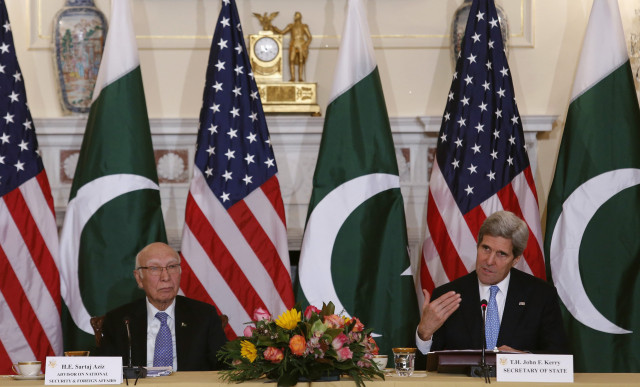‘Strategic patience’ and its limitations
Strategic patience plan is yielding some dividends for Pakistan

US Secretary of State John Kerry (R) and Pakistan's National Security and Foreign Affairs Advisor Sartaj Aziz deliver opening remarks at a ministerial-level meeting at the State Department in Washington, January 27, 2014. PHOTO: REUTERS
A few months earlier, Russian Deputy Foreign Minister Sergei Ryabkov also used the term ‘strategic patience’ while describing Moscow’s policy towards Washington.
The idea sprung to life with the Obama administration’s policy towards North Korea’s nuclear proliferation. It is merely a wait-and-see approach towards a country’s foreign policy behaviour.
According to Russian experts, ‘strategic patience’ has prevailed throughout the so-called New Cold War where Russia is believed to be a balancer in a multipolar world order.
The stringent US policies towards Russia will abate with time, and Washington will grab a seat at the negotiating table — where Moscow has been waiting — for its own national interests.
The recent trend between the US and North Korea shows that the Trump administration is reverting from its ‘maximum pressure’ approach to ‘strategic patience’ — resulting in the recent overtures between Trump and Kim.
The idea of ‘strategic patience’ can also be applied to Pakistan, where the country has constantly been tested on its foreign policy fronts due to its policy orientations.
Until recently, the US-Pakistan relations were at its lowest. Congressmen introduced several bills to block military aid to Pakistan, putting more pressure on Islamabad’s as Washington continued to malign Pakistan for ‘doing nothing’ to combat terrorism and mollycoddling terror groups.
In the case of its neighbours, Pakistan received the blame by Iran for ‘harbouring terrorists’, when a suicide attack took place in Sistan, killing 27 Iranian Revolutionary Guards, at a time when India was also accusing Pakistan of similar allegations after the Pulwama attack.
Lastly, Pakistan’s relation with Afghanistan has been a constant disappointment. With India lobbying to maintain its strategic depth in Afghanistan, Kabul has been on an uncompromising path with Islamabad, resulting in an open blame-game epoch.
The ‘strategic patience’ plan is yielding some dividends for Pakistan. Its geostrategic location and economic positioning in the region have already given it a significant stature in world politics as countries such as China, Saudi Arabia, the UAE, Qatar, Turkey, Malaysia, and now Russia have opened their bilateral relations, with mutual respect and beneficial relations.
Pakistan and Iran moved closer to overcome a hiccup in their relations, agreeing to not allow ‘third parties’ to interfere in their longstanding relations. President Ghani’s recent visit also hints at Islamabad’s perseverance in its Afghan policy.
The meetings marked a new approach towards the future while burying the past. This was followed by an invitation from the White House to our PM, indicating a veiled acknowledgment of Pakistan’s policy persistence and inclination. The US seems to be detracting from its pressure and unthankful rhetoric.
While the ‘strategic patience’ approach has borne fruits in the past, it undoubtedly has its limitations as well. Obama’s administration ended up retracting its policy towards North Korea because it did not halt its nuclear programme.
For Russia, strategic patience was put on the backburner in the Syrian and Crimean crises. Similarly, Pakistan and India almost plunged into an all-out nuclear war after the Pulwama incident.
The limitations increase when dealing with the country’s domestic environment. Financial choking, active hybrid warfare, and transnational proxies are a few in Pakistan’s case. However, Pakistan is now in the process of successfully maneuvering its security-oriented policy towards a developmental one.
The positive impact of ‘strategic patience’ will soon spiral out in the region and international players will realise the importance of such an ideology in foreign policy.
Published in The Express Tribune, July 20th, 2019.
Like Opinion & Editorial on Facebook, follow @ETOpEd on Twitter to receive all updates on all our daily pieces.















COMMENTS
Comments are moderated and generally will be posted if they are on-topic and not abusive.
For more information, please see our Comments FAQ